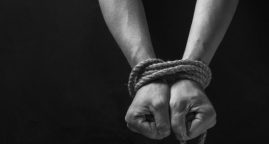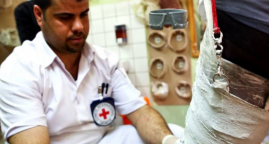Ahead of World Day against human trafficking, UN expert stresses States’ obligation to stop ‘gross human rights violations’
Article published on UN website on 07/29/2018
Ahead of the World Day Against Trafficking in Persons on Monday, the UN human rights expert on the issue has emphasized that both victims and potential victims’ rights must be upheld – especially women and children – and appealed for all States to prevent and combat the global scourge.
Many of those falling prey to traffickers are migrants, including refugees and asylum seekers who have left their country of origin for various reasons; including conflict, natural disaster, persecution or extreme poverty.
“They have left behind their social protection network, and are particularly vulnerable to trafficking and exploitation,” said Maria Grazia Giammarinaro, Special Rapporteur on trafficking in persons, in a statement marking the Day.
Ms. Giammarinaro observed that in the current “poisonous anti-migration political atmosphere,” migrants are often targeted as a threat, while in fact they are a net-gain for host countries where they live and work.
Against that backdrop, the UN expert stressed that anti-trafficking discourse is often misused “to justify restrictive migration policies and push-back activities.”
“Taking a stand against xenophobic and racist approaches, as well as violence, hatred and discrimination, is a moral duty which is in everyone’s power,” she underscored.
Calling it “a gross human rights violation,” Ms. Giammarinaro argued that States have an obligation to prevent trafficking.
Turning to the Global Migration Compact, the UN expert asserted that in addition to international protection schemes, States should establish individualized approaches to gauge migrants’ vulnerabilities, and provide them with tailored protections.
“In many countries, human rights activists and civil society organizations have been criminalized and ostracized for acting in solidarity with migrants and victims, and potential victims of trafficking,” she flagged.
Dismissing as “unacceptable” any attempt to delegitimize their humanitarian work, Ms. Giammarinaro said that civil society organizations globally play “a pivotal role” in saving lives.
Non-governmental organizations are also important in identifying trafficking victims, which according to the UN expert is “essential for ensuring access to protection and rehabilitation for victims, and should be prioritized, including during large mixed migration movements.”
“On World Day Against Trafficking in Persons, my message is that, even in difficult times, inclusion, not exclusion, is the answer,” she concluded
UN Special Rapporteurs serve in their individual capacity, independent from any government or organization.
Related Articles
‘Time to stamp out human trafficking,’ says Guterres; UN pledges action to eradicate ‘heinous crime’
09/27/2017. “Human trafficking is all around us, in all regions of the world,” said Mr. Guterres, referring to such practices as forced labour, sexual servitude, recruitment of child soldiers and other forms of exploitation and abuse.
It’s not just NGOs tackling humanitarian crises. Banks have a role too
05/19/2017. Of the 90 million people with physical disabilities around the world who need a mobility device, just one in 10 can access physical rehabilitation services.
UNESCO Rewrites Jerusalem’s History
10/21/2016. The latest vote essentially denies Jewish and Christian ties to Jerusalem.






